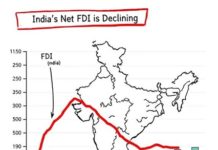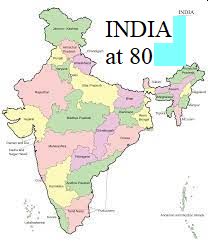INVESTMENT PERSPECTIVE
By J Mulraj
Aug 14-20, 2022
Great achievements, yet lots to be done
Speaking from the ramparts of the Red Fort on India’s 75th year of Independence, Prime Minister Modi spoke of India’s achievements, and vowed to tackle corruption and other pending issues. In the next 25 years, Modi has set 5 objectives – an India that is developed, is free from a colonial mindset, is proud of its heritage, is united and integrated and whose citizens put duty above all. Each of these is laudable.
What are the steps needed to achieve these objectives.
Today, a developed country has an average per capita income of $ 12,000-15,000. India’s 2022 per cap is estimated at $ 1850. To grow to $ 12,000 in 25 years it must compound at 8%. What has been this Government’s record since it took over in 2014? In 2014, per capita income was $ 1574, which grew to $ 1850 in 2022 at a compound rate of 2%. Even allowing for the lost years due to Covid, the assumption of an 8% growth, for the next 25 years, is a big ask. It will need huge reforms, towards a freer market.
Getting rid of a colonial mindset is an excellent target. Let it begin at the highest, political level. No one is, or should be, above the law. Yet we find that, despite raids on politicians uncovering huge ill-gotten gains, and mountains of cash, (notwithstanding the efforts of demonetization to remove cash from the economy) no serious action is ever taken. PM Modi’s vow to tackle corruption was taken before the 2014 election, but we do not see equality before the law yet. Instead, on switching political loyalties, the offence tends to disappear. A simple example of erasing a colonial mindset is the obnoxious practice of closing traffic routes for VVIP movement! If we wish to erase a colonial mindset, let our polity emulate the Swedes. Swedish parliamentarians earn a salary just 2 times that of an elementary school teacher, use public transport to travel, live in a tiny apartment where they wash/iron their own clothes and are not addressed as ‘your excellency’. Can the polity set an example by emulating Sweden, to become free of the colonial mindset?
This is not to decry India’s tremendous achievements in various fields. In electronic transactions India is a global leader, our UPI (Unified Payment Interface) system is truly unique and has allowed all sections of society to participate in the economy, without paying for the system. Kudos to the Government for this!
The Atmanirbhar (self reliance) programme has allowed India to develop indigenous capabilities in various fields, most notably in defence. Indian produced defence systems like Brahmos, a hypersonic missile and Tejas, a light multirole fighter, are seeing demand. India exported Rs 13,000 crores of defence material, which, though only 2.7% of our imports, is a good start.
India’s Covid vaccination programme was the world’s largest, and the CoWin app allows the people to download, or to show on a hand held, a vaccination certificate, which not many countries have managed to do.
Sunil Mittal has complimented the Government on ease of doing business, spectrum allotted to Bharti Airtel after the 5G auction was done immediately after the auction and without pacing Government corridors, as earlier.
So, India’s achievements are impressive, but lots more needs to be done.
Judicial reforms are the most urgent. The latest example being the release of 11 persons convicted for life for the rape of Bilkis Bano and the murder of 7 persons, including a 3 year old. By any definition, this is a heinous crime, and their release requires an urgent review. The objectives stated by the preamble to the Indian constitution is to secure justice, liberty and equality to all citizens and promote fraternity to maintain unity and integrity of the nation.
We do not see equality. And we do not see speed in decisions. Without these India cannot hope to become a developed nation, as is the objective. Thousands of people have been duped by scamsters in Ponzi schemes such as NSEL, Rose Valley, and others, and neither the investigative system nor the judicial system, nor yet the Government, comes to the aid of the victims. In fact, assets of defaulters have been sold, and moneys are retained by the agencies instead of being returned to the victims, which, surely, is a huge travesty of justice, and lays bare the claim to tackle corruption. Why not start by setting an example. It should be easy to do.
Nor is the tax system equitable. Agricultural income is exempted from tax, in sympathy for the small farmer. But it is the large farmer, whether genuine or on paper (to whitewash unaccounted income) that is the beneficiary. Everyone, including the IT Department, knows this, but there is no political will to tackle it. The solution is simple. Exempt the small farmer, by defining small, let us say, one who makes Rs 25 lacs per year (by the way that’s 10 times the exemption for everyone, who have to pay tax after Rs 2.5 lacs). After that threshold, the ‘farmer’ must pay tax at the relevant rates. Why not? The Government will not affect its vote bank of small farmers. Direct tax collections are low at 6.1% of GDP, primarily because of this exemption, which permit the wealthy to evade taxes. Let us see if this Government can help fight corruption by amending the tax provisions for agri income.
There is now a debate on whether Governments, central or state, should promise freebies, in order to seduce the electorate. In this, too, there is a simple solution. Allow any party to make such promises, provided the party pays a part of the cost (say, 25%, but it could be different) from its own coffers. That’s when the shoe will pinch. Let us see if such ideas can be accepted.
Another problem is that of the practice of democracy itself. Political parties are prone to split mid-term, and not on the firm grounds of principle, but on the shaky one of ambition/greed. Can the polity consider this idea? Let we contemplate that members of any party so splitting away, lose, in a subsequent election, say 25% of the votes garnered, for the ‘crime’ of going against the electoral mandate? Maybe, as the world’s largest democracy, we can set such an example? Many more things would need to be done (the state of our roads and pavements are disgraceful, tax paying citizens deserve to get better roads/pavements they paid for), but too numerous to cover.
Last week the BSE sensex rose 183 points to close at 59646.
What next?
The bullish scenario emanates from the huge amount of liquidity awaiting investment. Foreign institutional investors have started investing in Indian equities, as the India story is good, an exemption to the gloomy prognostications for most developed countries. Continuing high inflation would mean that central banks would continue to raise interest rates to combat it, and this, in turn, would cause/prolong recession.
Europe is in a sorry state due to shortage of energy. Russia has, last week, further cut gas supplies, citing a shut down for maintenance. Europe does not have alternate supplies of gas or of oil and, with winter coming, will need to buy, at any price. This means that prices of crude will rise further, thereby fuelling further inflation.
The nuclear plant in Ukraine, at Zaporizhzhia, captured by the Russians, but managed by the Ukranians, is an accident waiting to happen. A missile could cause it, or a curtailment of power to cool the reactor.
Another accident waiting to happen is over Taiwan. A distraught Xi Jinping, eager for a third term, but facing huge domestic issues such as a collapsed realty sector, a strained banking system, and a locked down manufacturing sector, may take the risk of a conflict over Taiwan, perhaps on the two smaller of its islands closest to it. That, in turn, would lead, if not to a military response, at least to economic sanctions, which would ring the death knell of globalization.
In the face of such issues it is difficult to rely solely on excess global liquidity as a bullish factor.
If India’s polity can show resolve and commitment to tackling pending reforms, India @ 80 would be a marvelous time. After all, it’s not only the citizens who have a duty! Jai Hind!










































COMMENTS